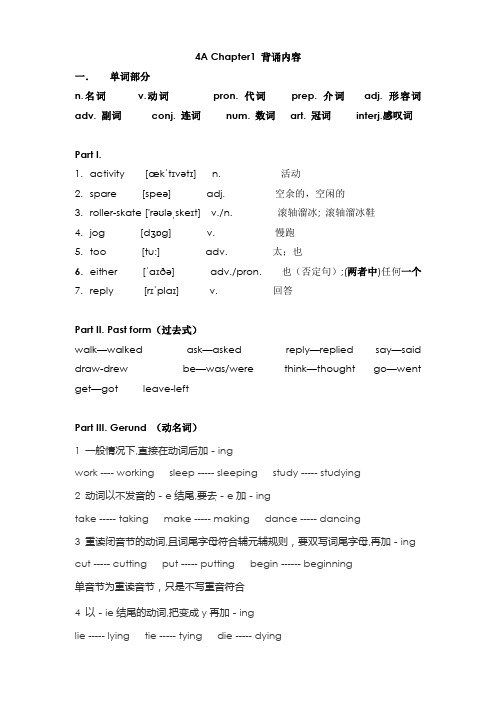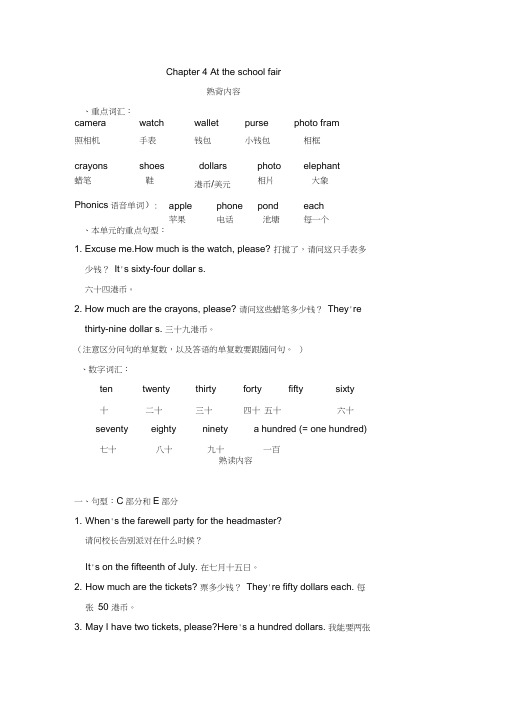朗文a4-6单元复习资料
朗文3AChapter4-6词汇句型

Chapter6A trip to the beach
Words&phrases单词和词组
1.trip旅行
2.beach海滩
3.children孩子们——child孩子
4.collect shells收集贝壳
5.listen to the waves听海浪声
6. swallaw salty water吞咸的海水
19.a / one hundred 100
20. forty-five55
21. thirty-seven37
22.sixty-four64
23.eighty-eight88
24. fifty-six 56
25.thirty-nine39
26.key ring钥匙圈
27.farewell party欢送会
4.When’s the farewell party for the headmaster? It’s on the fifteenth of July.
为校长举办的欢送会什么时候?在7月15日。
5. How much are the tickets?They’re fifty dollarseach.这些票子多少钱?每张50美元。
Sounds音标
ell/ el /
smell闻
shell贝壳
sell卖
all/ɔ:l/
ball球
tall高的
stall货摊
6. May I have two tickets, please? Here you are.我可以要两张票吗?给你。
Sounds音标
ph/ f /
photo照片
elephant大象
phone电话
朗文版小学英语a各单元知识点汇总精编WORD版

朗文版小学英语a各单元知识点汇总精编W O R D版IBM system office room 【A0816H-A0912AAAHH-GX8Q8-GNTHHJ8】U n i t1C h a n g e s a t h o m efeed the baby 喂养婴儿take the baby for a walk 带宝宝去散步read stories to the baby 给宝宝读故事bath the baby 给宝宝洗澡dress the baby 给宝宝穿衣服have a baby 生一个宝宝teach the baby rhymes 教宝宝诗歌share my toys with the baby 同宝宝分享玩具I’m going to have a new brother or sister. 我将要有一个弟弟或者妹妹了。
My mother is going to have a baby. 我妈妈要生一个宝宝了。
I’m going to teach the baby rhymes. 我打算要教宝宝诗歌。
I’m going to share my toys with the baby. 我打算要同宝宝分享我的玩具。
··························································································at recess 在休息时间some exciting news 一些激动人心的消息wake up 醒过来What are you going to do to help your mother? 你打算将来做什么来帮助你妈妈?Would you like to hold my baby? 你想抱一下我的宝宝吗?I’m going to visit her every day. 我打算每天都去看她。
最新香港朗文4A各单元知识要点 词汇语法

4A Chapter1 背诵内容一.单词部分n.名词v.动词pron. 代词prep. 介词adj. 形容词adv. 副词conj. 连词num. 数词art. 冠词interj.感叹词Part I.1.activity [ækˈtɪvətɪ] n. 活动2.spare [speə] adj. 空余的,空闲的3.roller-skate ['rəʊləˌskeɪt] v./n. 滚轴溜冰; 滚轴溜冰鞋4.jog [dʒɒg] v. 慢跑5.too [tu:] adv. 太;也6.either [ˈaɪðə] adv./pron. 也(否定句);(两者中)任何一个7.reply [rɪˈplaɪ] v. 回答Part II. Past form(过去式)walk—walked ask—asked reply—replied say—said draw-drew be—was/were think—thought go—went get—got leave-leftPart III. Gerund (动名词)1 一般情况下,直接在动词后加-ingwork ---- working sleep ----- sleeping study ----- studying2 动词以不发音的-e结尾,要去-e加-ingtake ----- taking make ----- making dance ----- dancing3 重读闭音节的动词,且词尾字母符合辅元辅规则,要双写词尾字母,再加-ing cut ----- cutting put ----- putting begin ------ beginning单音节为重读音节,只是不写重音符合4 以-ie结尾的动词,把变成y再加-inglie ----- lying tie ----- tying die ----- dying二.词组部分1.i n one’s spare time在某人的空余时间2.listen to (the) music 听音乐3.play chess 下棋4.like/love/enjoy doing 喜欢干某事5.go swimming (去)游泳6.go jogging (去)慢跑7.go roller-skating (去)溜冰8.be good at sth./doing 擅长于某事/干某事9.be poor at sth./doing 不擅长于某事/干某事10.be interested in sth./doing 对干某事/干某事感兴趣11.be afraid of sth./doing 害怕某事/干某事12.at/on the weekend 在周末at/on weekends13.on weekdays 在工作日14.be busy with sth. 忙于某事15.be busy doing 忙于干某事16.enjoy oneself= have a good time 某人玩得很开心17.a family helper 一位家庭帮手18.pick up kids 接小孩19.play the piano/violin 弹钢琴,拉小提琴(西洋乐器名词前加the )20.play Erhu 拉二胡(民族乐器前无the)21.play table tennis 打羽毛球(球类名词前无the)22.play on the swing/slide 在秋千(滑滑梯)上玩23.play with sb. 与某人一起玩24.play with sth. 玩耍某物25.a bit later 一会儿以后26.walk away sadly 难过地走开了27.walk the dog 溜狗28.walk home=go home on foot 走回家29.go home =go back home 回家30.after that 在那以后31.the black notes (钢琴上)黑键32.see sb. doing 看到某人在干某事33.make a new friend named Tom 交了一个叫汤姆的朋友34.in fact = actually/ˈæktʃʊəlɪ/事实上35.in the gym 在体育馆36.indoor stadium /'steɪdɪəm/ 室内体育馆37.finish sth./doing sth. 完成某事/干某事38.be important to sb. 对某人而言是重要的(绿色字体部分为拓展内容,供学有余力的小朋友默写。
最新香港朗文4A各单元知识要点词汇语法

最新香港朗文4A各单元知识要点词汇语法以下是最新版香港朗文4A各单元的词汇和语法要点:Unit 1: Going Places- 词汇:transportation(交通工具),destination(目的地),navigate(导航),explore(探索)- 语法:一般现在时,there is / there are句型,情态动词can的用法Unit 2: Nature's Forces- 词汇:natural disasters(自然灾害),flood(洪水),earthquake(地震),hurricane(飓风),volcano(火山)- 语法:一般过去时,情态动词must / mustn't的用法Unit 3: Materials and Properties- 词汇:materials(材料),properties(特性),solid(固体),liquid(液体),gas(气体)- 语法:现在进行时,情态动词should / shouldn't的用法Unit 4: Diverse Cultures- 词汇:diverse(多样化的),culture(文化),tradition(传统),custom(风俗),celebration(庆祝活动)- 语法:现在完成时,情态动词could / couldn't的用法Unit 5: The Arts- 词汇:artistic(艺术的),creative(创造性的),performance(表演),sculpture(雕塑),painting(绘画)-语法:一般将来时- 语法:过去进行时,情态动词may / must的用法以上是最新香港朗文4A各单元的词汇和语法要点。
请注意,这些要点可能会因版本差异而有所变化,建议参考最新教材或教师的指导。
朗文3A4-6单元复习资料

Chapter 4 At the school fair熟背内容、重点词汇:camera watch wallet purse photo fram照相机手表钱包小钱包相框crayons shoes dollars photo elephant蜡笔鞋港币/美元相片大象Phonics语音单词):apple phone pond each苹果电话池塘每一个、本单元的重点句型:1. Excuse me.How much is the watch, please? 打搅了,请问这只手表多少钱?It's sixty-four dollar s.六十四港币。
2. How much are the crayons, please? 请问这些蜡笔多少钱?They'rethirty-nine dollar s. 三十九港币。
(注意区分问句的单复数,以及答语的单复数要跟随问句。
)、数字词汇:ten twenty thirty forty fifty sixty十二十三十四十五十六十seventy eighty ninety a hundred (= one hundred) 七十八十九十一百熟读内容一、句型:C部分和E部分1. When's the farewell party for the headmaster?请问校长告别派对在什么时候?It's on the fifteenth of July. 在七月十五日。
2. How much are the tickets? 票多少钱?They're fifty dollars each. 每张50 港币。
3. May I have two tickets, please?Here's a hundred dollars. 我能要两张吗?这是一百港币。
Here you are. Thank you. 给你,谢谢。
Chapter 5 Things at home熟背内容一、重点词汇:1. a cushi on an armchair a marble a stone一个靠垫-「把扶手椅一个弹球一块石头on in在…上面在…里面2.反义词:smooth ------ r ough soft ---- ---hard光滑的粗糙的柔软的坚硬的、重点句型:I. That chair is hard. Don'sit on it.那把椅子是硬的。
最新朗文4A-Chapter-6复习提要

《朗文英语4A》复习提要Chapter 6: Wonderful places精彩的地方I. 经过第6章的学习,下面的新单词我们要准确无误地读(read them correctly),知道它们的中文意思(know the Chinese meaning),不看书进行英汉互译(translate),并且还要会拼写(spell)。
village 村庄island 岛屿temple 寺庙crocodile 鳄鱼snake 蛇tiger 老虎a camel trip 一次骆驼之旅a boat trip 一次乘船之旅a helicopter trip一次直升机之旅a waterfall 一条瀑布a river 一条河流a cave 一个洞穴visit(visited) 游览、参观、拜访see(saw) 看见go on(went on) 进行interesting 有趣的dangerous 危险的exciting 激动人心的beautiful 美丽的2.形容词的比较级和最高级。
要求:知道中文意思,会读,会拼写,知道如何变成比较级和最高级的规则。
II.句型。
下面的关键句型我们要会读(read), 知道意思(know the Chinese meaning), 会根据不同的语境来运用(use them in different contexts),会写(write them correctly)。
New sentences:A. We visit ed some interesting place s.The village s were more interesting than the temple s.The island s were the most interesting.我们游览了一些有趣的地方。
村庄比寺庙更有趣。
岛屿最有趣的。
B. We went on some exciting trip s.The camel trip was more exciting than the boat trip.The helicopter trip was the most exciting.我们进行了一些令人兴奋的旅行。
朗文4A Chapter 6复习提要

《朗文英语4A》复习提要Chapter 6: Wonderful places精彩得地方I、经过第6章得学习,下面得新单词我们要准确无误地读(read them correctly),知道它们得中文意思(know the Chinese meaning),不瞧书进行英汉互译(translate),并且还要会拼写(spell)。
village 村庄island 岛屿temple 寺庙crocodile 鳄鱼snake 蛇tiger 老虎a camel trip 一次骆驼之旅a boat trip 一次乘船之旅a helicopter trip一次直升机之旅a waterfall 一条瀑布a river 一条河流a cave 一个洞穴visit(visited) 游览、参观、拜访see(saw) 瞧见go on(went on) 进行interesting 有趣得dangerous 危险得exciting 激动人心得beautiful 美丽得2.形容词得比较级与最高级。
要求:知道中文意思,会读,会拼写,知道如何变成比较级与最高级得Chinese meaning), 会根据不同得语境来运用(use them indifferent contexts),会写(write them correctly)。
New sentences:A、 We visit ed some interesting place s、The village s were more interesting than the temple s、The island s were the most interesting、我们游览了一些有趣得地方。
村庄比寺庙更有趣。
岛屿最有趣得。
B、 We went on some exciting trip s、The camel trip was more exciting than the boat trip、The helicopter trip was the most exciting、我们进行了一些令人兴奋得旅行。
香港朗文2B chapter 4-6 复习课件 期末复习

in +季节 in spring/ summer/autumn/winter
Primary Longman Elect
2B Chapter 6 What / Which / Why
What / Which / Why
• We ask people What questions when we don’t know what the answer might be.
in the morning in the afternoon in the evening at night
10:00 12:00 a.m.
6:00 p.m.
12:00
e.g. 10 a.m. (= ten o’clock in the morning)
1.in the morning/ afternoon/evening
Chapter 4 My day
by Sophia
Primary Longman Elect
2B Chapter 4 Telling the time
Telling the time
12:55 / Twelve fifty-five.
fifty-five
five
fifty
ten
forty-five
in the morning in the afternoon in the evening at night
9:00 12:00
6:00
Before twelve o’clock
is in the morning.
e.g. Nine o’clock in the morning.
Telling the time
- 1、下载文档前请自行甄别文档内容的完整性,平台不提供额外的编辑、内容补充、找答案等附加服务。
- 2、"仅部分预览"的文档,不可在线预览部分如存在完整性等问题,可反馈申请退款(可完整预览的文档不适用该条件!)。
- 3、如文档侵犯您的权益,请联系客服反馈,我们会尽快为您处理(人工客服工作时间:9:00-18:30)。
Chapter 4 At the school fair熟背内容一、重点词汇:camera watch wallet purse photo frame照相机手表钱包小钱包相框crayons shoes dollars photo elephant蜡笔鞋港币/美元相片大象Phonics(语音单词):apple phone pond each苹果电话池塘每一个二、本单元的重点句型:1.Excuse me. How much is the watch, please?打搅了,请问这只手表多少钱?It’s sixty-four dollar s.六十四港币。
2.How much are the crayons, please?请问这些蜡笔多少钱?They’re thirty-nine dollar s.三十九港币。
(注意区分问句的单复数,以及答语的单复数要跟随问句。
)三、数字词汇:ten twenty thirty forty fifty sixty十二十三十四十五十六十seventy eighty ninety a hundred (= one hundred)七十八十九十一百熟读内容一、句型:C部分和E部分1.When’s the farewell party for the headmaster?请问校长告别派对在什么时候?It’s on the fifteenth of July.在七月十五日。
2.How much are the tickets?票多少钱?They’re fifty dollars each.每张50港币。
3.May I have two tickets, please? Here’s a hundred dollars. 我能要两张吗?这是一百港币。
Here you are. Thank you.给你,谢谢。
Chapter 5 Things at home熟背内容一、重点词汇:1. a cushion an armchair a marble a stone一个靠垫一把扶手椅一个弹球一块石头on in在…上面在…里面2.反义词:smooth ------- rough soft ------- hard光滑的粗糙的柔软的坚硬的二、重点句型:1.That chair is hard. Don’t sit on it.那把椅子是硬的。
不要坐上去。
Please sit in this armchair. It’s soft.请坐在这把扶手椅上。
它是柔软的。
These marbles are smooth and round.这些弹球是圆滑的。
Can I feel them? Sure.我可以感受它们吗?当然可以。
2.This + 名词单数+ is …这个……是……如:This cushion is soft. 这个靠垫是柔软的。
I like it. 我喜欢它。
I don’t like it. 我不喜欢它。
3.These + 名词复数+ are …这些……是……如:These stones are hard and rough. 这些石头是硬的和粗糙的。
I like them. 我喜欢它们。
I don’t like them. 我不喜欢它们。
(it和them是宾格,it—它,表单数,them—它们,表复数)4.----This cushion is soft. ----Can I feel it? ----Sure.这个靠垫很柔软。
我可以感受它吗?可以。
----This rabbit is smooth. ----Can I feel it? ----Sure.这只兔子是柔软的。
我可以感受它吗?可以。
----This dog is rough. ----Can I feel it? ----Sure.这只狗是粗糙的。
我可以感受它吗?可以。
----These stones are hard and rough. ----Can I feel them? ----Sure.这些石头很硬和粗糙。
我可以感受它们吗?可以。
熟读内容一、词汇:please sit round feel请坐圆形的感受sure teddy bear tissues key当然玩具熊纸巾钥匙分写形式:It’s = It is They’re = They are don’t = do not它是它们是表否定反义词:soft——hard big——small stand——sit柔软的坚硬的大的小的站坐smile——cry this——that these——those微笑哭这个那个这些那些sit on the chair/sofa sit in the armchair坐在椅子/沙发上坐在扶手椅上二、句型:1.They’re soft. I think they’re tissues. Yes, they’re tissues.它们是柔软的。
我想它们是纸巾。
是的,它们是纸巾。
2.They’re round. They’re hard and smooth. I think they’re marbles. Yes, they’re marbles.它们是圆的。
它们是硬的和光滑的。
我想它们是大理石。
是的,它们是大理石。
3.It’s hard and rough. I think it’s a key. Yes, it’s a key.它是硬的和粗糙的。
我想它是一条钥匙。
是的,它是一条钥匙。
4.It’s soft. I think it’s a teddy bear. Yes, it’s a teddy bear.它是柔软的。
我想它是一只玩具熊。
是的,它是一只玩具熊。
Chapter 6 A trip to the beach熟背内容一、重点词汇:1.collect—collecting shells listen—listening to the waves捡贝壳听海浪的声音swallow--swallowing salty water make—making a sandcastle 喝咸的海水做一个沙城堡smell and eat—smelling and eating food on a barbecue 闻和吃烧烤walk—walking on the sand touch—touching the warm sand在沙上走摸温暖的沙子2.Phonics(语音单词):smell shell sell--buy ball tall—short stall闻贝壳卖买球高矮货摊二、重点句型:1.What do you like doing at the beach, children? I like collecting shells.孩子们,你们喜欢在沙滩上做什么?我喜欢捡贝壳。
2.What don’t you like doing at the beach? I don’t like walking on the sand. 你们不喜欢在沙滩上做什么?我不喜欢在沙上走。
熟读内容一、词汇:1.pretty shells gentle waves fresh air look at have fun 漂亮的贝壳温和的海浪新鲜的空气看着玩得快乐二、句型:1.What do you like doing at the beach, Charlie?查理,你喜欢在沙滩上做什么?I like touching the warm sand.我喜欢摸温暖的沙子。
2.What don’t you like doing at the beach, Betty?贝蒂,你不喜欢在沙滩上做什么?I don’t like swallowing salty water.我不喜欢喝咸的海水。
3.What do you like doing at the beach, children?孩子们,你们喜欢在沙滩上做什么?We like smelling and eating food on a barbecue.我们喜欢闻和吃烧烤。
4.What don’t you like doing at the beach, children?孩子们,你们不喜欢在沙滩上做什么?We don’t like listening to the waves.我们不喜欢听海浪的声音。
5.What do they like doing at the beach? They like making a sandcastle. 他们喜欢在海滩上做什么?他们喜欢做一个沙城堡。
What don’t they like doing at the beach? They don’t like fishing.他们不喜欢在沙滩上做什么?他们不喜欢钓鱼。
6.What do you like at the beach, Beeno?比奴,你在沙滩上喜欢什么?I like the pretty shells. I like looking at them.我喜欢美丽的贝壳。
我喜欢看着它们。
7. What do you like at the beach, Beeno?比奴,你在沙滩上喜欢什么?I like the gentle waves. I like listening to them.我喜欢温暖的海浪。
我喜欢听着它们。
8. What do you like at the beach, Beeno?比奴,你在沙滩上喜欢什么?I like the fresh air. I like smelling it.我喜欢新鲜的空气。
我喜欢闻它。
9.What don’t you like? I don’t like salty water. I don’t like swallowing it.你不喜欢是什么?我不喜欢咸的海水。
我不喜欢喝它。
10. What don’t you like? I don’t like the warm sand. I don’t like touching it.你不喜欢什么?我不喜欢温暖的沙子。
我不喜欢触摸它。
三、现在分词(动词ing)变化规律:1.直接加ing。
如:smell—smelling listen—listening2.以不发音e结尾的,去e加ing。
如:dance—dancing make—making3.重读闭音节的,双写最后一个字母。
如:swim—swimming jog—jogging。
